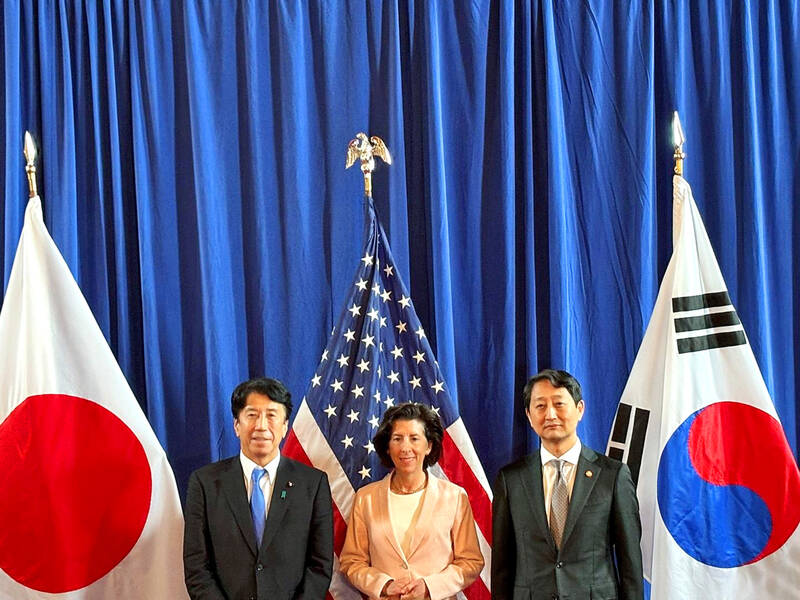Commerce and trade ministers from the US, Japan and South Korea on Wednesday vowed to cooperate on strategic issues, including artificial intelligence (AI) safety, export controls, clean energy and semiconductor supply chains.
“We’re doubling down our efforts to work together,” US Secretary of Commerce Gina Raimondo said at a meeting in Washington.
“As we three are leading economies in manufacturing, services, technology and innovation, and we have to work together to benefit not just our countries, but the safety and security of the world,” Raimondo said.

Photo:EPA-EFE
She was joined at the inaugural trilateral meeting by Japanese Minister of Economy, Trade and Industry Ken Saito and South Korean Minister of Trade, Industry and Energy Ahn Duk-geun. The meetings were decided last year by the countries’ leaders at an August summit at Camp David.
The ministers said in a statement after the meeting that they would “focus our joint efforts on a set of strategic areas designed to enhance the security and prosperity of our people and the Indo-Pacific region. We aim to prioritize cooperation to strengthen the resilience of supply chains in key sectors, including semiconductors and batteries,” as well as AI safety, critical minerals, cybersecurity and technical standard setting.
Saito said the three “agreed to realize a strong and reliable supply chain for strategic materials by working together with like-minded countries, including Japan, the United States and South Korea, and designing a market where factors other than price are fairly evaluated.”
Last month, US President Joe Biden vowed to sharply increase tariffs on critical minerals from China, as Washington vowed to reduce China’s dominance of critical mineral supply chains.
In March, a Department of Commerce official said the US was asking allies to stop domestic companies from servicing certain chipmaking tools for Chinese customers, a key part of the US’ push to hobble China’s chipmaking capabilities.
“We expect the South Korea-US-Japan industry ministers’ meeting to serve as an institutional basis for deepening and developing industrial cooperation among the three countries and jointly responding to global risks,” Ahn said.

Mercuries Life Insurance Co (三商美邦人壽) shares surged to a seven-month high this week after local media reported that E.Sun Financial Holding Co (玉山金控) had outbid CTBC Financial Holding Co (中信金控) in the financially strained insurer’s ongoing sale process. Shares of the mid-sized life insurer climbed 5.8 percent this week to NT$6.72, extending a nearly 18 percent rally over the past month, as investors bet on the likelihood of an impending takeover. The final round of bidding closed on Thursday, marking a critical step in the 32-year-old insurer’s search for a buyer after years of struggling to meet capital adequacy requirements. Local media reports

US sports leagues rushed to get in on the multi-billion US dollar bonanza of legalized betting, but the arrest of an National Basketball Association (NBA) coach and player in two sprawling US federal investigations show the potential cost of partnering with the gambling industry. Portland Trail Blazers coach Chauncey Billups, a former Detroit Pistons star and an NBA Hall of Famer, was arrested for his alleged role in rigged illegal poker games that prosecutors say were tied to Mafia crime families. Miami Heat guard Terry Rozier was charged with manipulating his play for the benefit of bettors and former NBA player and

The DBS Foundation yesterday announced the launch of two flagship programs, “Silver Motion” and “Happier Caregiver, Healthier Seniors,” in partnership with CCILU Ltd, Hondao Senior Citizens’ Welfare Foundation and the Garden of Hope Foundation to help Taiwan face the challenges of a rapidly aging population. The foundation said it would invest S$4.91 million (US$3.8 million) over three years to foster inclusion and resilience in an aging society. “Aging may bring challenges, but it also brings opportunities. With many Asian markets rapidly becoming super-aged, the DBS Foundation is working with a regional ecosystem of like-minded partners across the private, public and people sectors

BREAKTHROUGH TECH: Powertech expects its fan-out PLP system to become mainstream, saying it can offer three-times greater production throughput Chip packaging service provider Powertech Technology Inc (力成科技) plans to more than double its capital expenditures next year to more than NT$40 billion (US$1.31 billion) as demand for its new panel-level packaging (PLP) technology, primarily used in chips for artificial intelligence (AI) applications, has greatly exceeded what it can supply. A significant portion of the budget, about US$1 billion, would be earmarked for fan-out PLP technology, Powertech told investors yesterday. Its heavy investment in fan-out PLP technology over the past 10 years is expected to bear fruit in 2027 after the technology enters volume production, it said, adding that the tech would